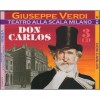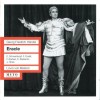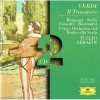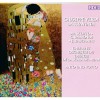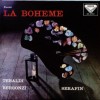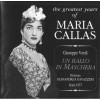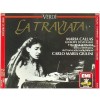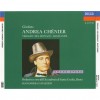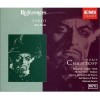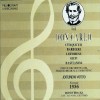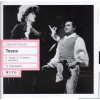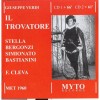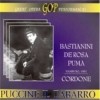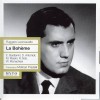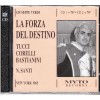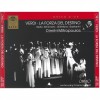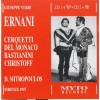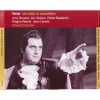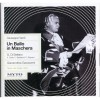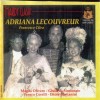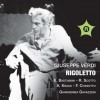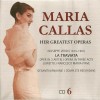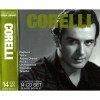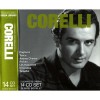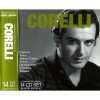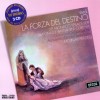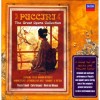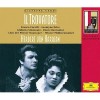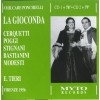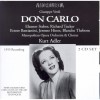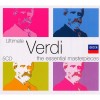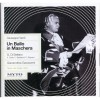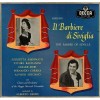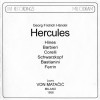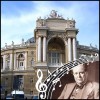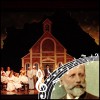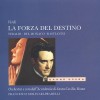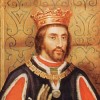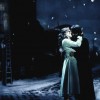| Voice/Instrument: |
Biography
Ettore Bastianini (September 24, 1922 – January 25, 1967) was an Italian opera singer who was particularly associated with the operas of Verdi. He had a prolific international career between 1945 and 1965 which was tragically cut short due to throat cancer. He began his professional career as a bass working in opera houses throughout Italy and in tours to Egypt and Venezuela during the 1940s. In 1952 he launched a career as a baritone that quickly earned him worldwide acclaim and brought him to the stages of many of the major opera houses in Europe and the United States. He was a frequent performer at La Scala between 1954-1963 and at the Vienna State Opera between 1958-1964. He was also a member of the Metropolitan Opera between 1954-1957 and again in 1965 during the last year of his career.
Born in Siena, Bastianini first became involved in performing in 1937 at the age of fifteen after becoming apprenticed to a pastry chef, Gaetano Vanni, who discovered his naturally beautiful voice and encouraged him to join the choir of his hometown's Cathedral. Between 1937-1938 he sang as a bass during masses and religious functions at the church. In 1939 he began training his voice with his first singing lessons under Fathima and Anselmo Ammanati who continued to train him as a bass. He gave his first professional concerts in 1940 and 1941 in Asciano and Siena at the Fortezza Medicea and Teatro dei Rozzi. In 1942 he won first prize at the 6th National Singing Contest at the Teatro Comunale Florence but he was soon drafted into the Italian Air Force which prevented him from immediately enjoying the scolarship that accompanied the prize.
After serving in the Italian Air Force between 1943-1944 toward the end of World War II, Bastianini began his professional career. On January 28, 1945, he made his debut as a soloist in a concert at the Teatro Rex in Siena, singing the bass arias "Vecchia zimarra" from Puccini's La bohème and "La Calunnia" from Rossini's Il barbiere di Siviglia. In November of that year, he made his operatic debut as Colline in La bohème at the Teatro Alighieri in Ravenna. His only son, Jago, was born in 1945.
In 1946 Bastianini finally was able to take advantage of the scholarship he won four years earlier and began taking operatic classes at the Teatro Comunale Florence. While there he sang in recitals alongside other future opera greats like Mirto Picchi, Fedora Barbieri, and Rolando Panerai. That same year he appeared in numerous operas with smaller Italian opera houses such as the Teatro Verdi in Florence. Among the roles he portrayed that year were his first performances of Zio Bonzo in Madama Butterfly, Don Basilio in Il barbiere di Siviglia and Sparafucile in Rigoletto.
In 1947 Bastianini embarked on a long tour of Egypt, performing in such cities as Cairo, Alexandria, and Giza. On the tour he shared the stage with Gino Bechi and Maria Caniglia and reprised the roles of Don Basilio and Sparafucile. He also portrayed the role of Raimondo in Lucia di Lammermoor. He spent the next year singing the bass repertoire in opera houses throughout Italy, including the Teatro Regio di Parma and Teatro Comunale di Bologna. On April 24, 1948, Bastianini made his La Scala debut as Teiresias in Stravinsky's Oedipus Rex. In 1949 he toured Egypt again and flew to Caracas, Venezuela to sing in productions of Aida (Ramfis), La Bohème, Lucia di Lammermoor, and Rigoletto.
Bastianini gave his first broadcast recital for the Italian Radio on 29 December 1950. Earlier that year he had toured Egypt again for a third time and appeared in operas in Italy. He toured Egypt again for a fourth time just before returning to Italy to give his last performance as a bass on April 1951 at Turin's Teatro Alfieri. For the performance he portrayed the same role with which he had begun his operatic career–Colline. Believing that his voice was suited to the baritone repertoire, and encouraged by his teacher, Luciano Bettarini, Bastianini left the stage for seven months to work on his technique.
Triumph on the international stage: 1952-1957
Just six months after having quit his career as a bass, Bastianini made his debut as a baritone on January 17, 1952, in Siena, as Germont in Verdi's La traviata. His performance was not well received, and he left the stage again for a brief period of intense vocal exercise to secure the top of his voice. Upon his return just weeks later, he performed as Rigoletto in Siena to rave reviews. This was followed by a successful Amonasro in Pescara and a triumphant return to the role of Germont in Bologna with Virginia Zeani as Violetta. He also gave several acclaimed performances at the Maggio Musicale Fiorentino including both Count Tomsky (Spring of 1952) and Prince Yeletsky (Spring of 1954) in Tchaikovsky's The Queen of Spades, Prince Andrei Bolkonsky in Prokofiev's War and Peace (Spring of 1953), and the title role in Tchaikovsky's Mazeppa (1954).
In 1953 Bastianini performed opposite Maria Callas for the first of many times as Enrico Asthon in Lucia di Lammermoor at the Teatro Comunale Florence. That same year he sang the role of Carlo Gérard in Umberto Giordano's Andrea Chénier for the first time at the Teatro Regio di Torino. He made his Metropolitan Opera debut as Germont on December 5, 1953, opposite Licia Albanese as Violetta and Richard Tucker as Alfredo. The following January he sang Enrico to Lily Pons's Lucia and Jan Peerce's Edgardo at the Met. On May 10, 1954, he made his debut as a baritone at La Scala, in the title role of Tchaikovsky's Eugene Onegin with Renata Tebaldi as Tatyana.
In the Fall of 1954, Bastianini joined the roster of the Metropolitan Opera in New York City where he sang regularly through May 1957. His roles at the Met during this time included Amonasro in Aida, Carlo Gérard, Count Di Luna in Il Trovatore, Enrico, Germont, Marcello in La Bohème, Escamillo in Carmen, Rodrigo in Don Carlo, and the title role in Rigoletto. He later returned to the Met in the Spring of 1960 to portray several roles including Don Carlo in La Forza del Destino. He returned to the Met again in January 1965 where he spent most of that year singing in several of his prior roles with the company and performing Scarpia in Tosca. His 87th and final performance at the Met was as Rodrigo on December 11, 1965. It was also coincidentally the last performance of his career.
While performing regularly at the Met during the mid 1950s, Bastianini continued to perform occasionally in Europe and in other opera houses in the United States. On May 28, 1955, he appeared opposite Maria Callas and Giuseppe di Stefano in La Scala's legendary production of La traviata, directed by Luchino Visconti and conducted by Carlo Maria Giulini. The following summer he made his first of several recordings for Decca Records: Alphonse XI in La Favorita and Don Carlo in La forza del destino. On October 31, 1955 he made his debut with the Lyric Opera of Chicago as Riccardo Forth in Vincenzo Bellini's I puritani with Callas as Elvira, Di Stefano as Arturo, and Mariano Caruso as Bruno. He was a regular performer at the Lyric Opera of Chicago between 1955-1958, singing such roles as Count di Luna, Don Carlo, Germont, and Marcello. In 1956 he returned to La Scala to sing his first Riccardo in Un ballo in maschera and he portrayed Figaro in The Barber of Seville at the Arena di Verona.
After leaving the Met in May 1957, Bastianini made his first appearance on television in a filmed version of Il trovatore with Leyla Gencer, Mario Del Monaco and Fedora Barbieri. That summer he sang Don Carlo in a legendary production of Verdi's Ernani at the Maggio Musicale Fiorentino under Dimitris Mitropoulos with Anita Cerquetti, Mario del Monaco, and Boris Christoff. This was followed by performances in four different operas in seven days in Bilbao and a return to La Scala in December 1957 for another highly lauded production: Un ballo in Maschera under Gianandrea Gavazzeni with Callas, Di Stefano, and Giulietta Simionato.
The golden years:1958-1962
In 1958 Bastanini sang his first Scarpia at the Teatro di San Carlo. This was followed by three other new roles to his repertoire at La Scala that summer: Belcore in L'elisir d'amore, Ernesto in Il Pirata (with Callas and Franco Corelli) and the title role in Nabucco. In July of that year he made his debut at the Salzburg Festival as Rodrigo under conductor Herbert von Karajan and then returned to Bilbao in September for several m0re performance. Towards the end of the year he sang four roles in five days at the Palacio de Bellas Artes in Mexico City and performed his only baroque opera role, Lichas in Handel's Hercules under Lovro von Matačić, at La Scala.
In September 1958 Bastanini sang for the first time at the Vienna State Opera as Scarpia opposite Renata Tebaldi's Tosca. He fell in love with the opera house and performed regularly there until his career ended in 1965. In the Fall of 1959 he made his debut with Dallas Opera singing Enrico and Figaro opposite Callas's Lucia and Rosina. The following December he sang his first Michonnet in Francesco Cilea's Adriana Lecouvreur at the Teatro di San Carlo. He returned to that house in 1960 to sing Don Carlo in Ernani, a role he also portrayed at the Salzburg Festival that year. Also in 1960, Bastanini sang the role of Severo in Donizetti's Poliuto in a production that marked the return of Callas to La Scala.
In February 1961 Bastanini made his debut with the Philadelphia Lyric Opera Company as Rigoletto. That same month he appeared in two productions at La Scala: Lucia di Lammermoor with Joan Sutherland and I Puritani with Renata Scotto. In December 1961 he returned to La Scala to sing his first and only performances of Rolando in Verdi's rarely heard opera La battaglia di Legnano. In 1962 he made his first and only appearance at the Royal Opera, Covent Garden as Riccardo, returned to the Lyric Opera of Chicago to sing the title role in Rigoletto, and sang Count Di Luna at La Scala and the Salzburg Festival in addition to several performances with the Vienna State Opera. His mother died in April of that year of cancer in Sienna.
Battling illness and the end of a career:1963-1967
In November 1962 Bastianini was diagnosed with a tumor in his throat just months after his mother's death from cancer. He didn't tell anyone but his family and some very close friends, partly because he was afraid that it would have a negative effect on his career. He spent the first four months of 1963 receiving treatments for his illness in Switzerland. Despite his illness, he went on singing, returning to the stage in April 1963 with performances of several of his staple roles at the Vienna State Opera. Critics noted that his voice now has a dryer quality than previously and were mixed in their reviews of his performances. Compounded with continuing health decline, Bastanini becomes somewhat depressed and was uncertain whether he wanted to continue performing.
On July 2, 1963 Bastianini attended the famous Palio di Siena and won a considerable amount of money betting on the horse race. The win considerably raized his spirits and shortly thereafter he had a successful appearance as Count Luna at the Salzburg Festival. In the following Autumn he made his debut in Tokyo in a lauded production of Il Trovatore which was broadcast live on Japanese television. In December of that year he made his last appearance at La Scala as Rodrigue in Don Carlo.
Bastiani's health continued to decline steadily over the last two years of his career. His performances during this time were inconsistent in their quality with some excellent days and some poor ones. He continued to perform regularly in Vienna in 1964 where he still had many fans and sang his last new role, Mefistofele in La Damnation de Faust, at the Teatro di San Carlo in Naples to good reviews. However, he gave a disastrous performance of Il Trovatore in Prato that year. In 1965, his last year on the stage, he returned to the Lyric Opera of Chicago to sing the role of Amonasro, the Teatro Comunale Florence to sing Scarpia, and the Cairo Opera House to sing Iago. He spent most of that year performing at the Met in a variety of roles to a varying degree of success. Some performances were well received but he was booed during a performance of Tosca singing Scarpia. His last operatic appearance was in Verdi's "Don Carlo" (as Posa) at the Met on 11 December 1965. He died of cancer on January, 1967 and was buried in Siena. There is a street named after him.






